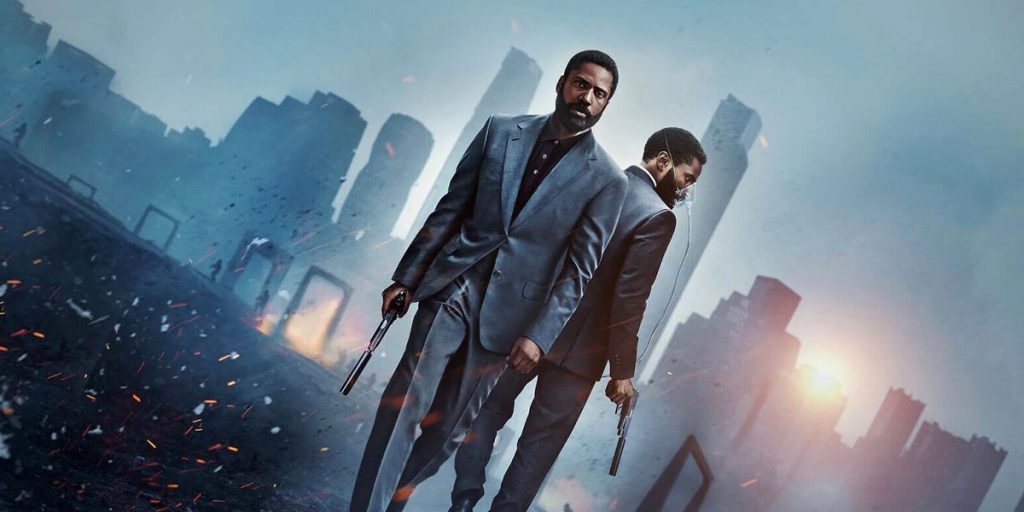Christopher Nolan’s Tenet is a technically flawless, elaborate, immersive experience that needs to be felt in order to be understood.
When the Protagonist of Christopher Nolan‘s spy thriller first becomes aware of the existence of an organisation called “Tenet”, his knowledge and future use of this ancient Latin palindrome come with a warning. The word “Tenet” – which literally means “to hold” and is generally used, in philosophy, to describe a principle or opinion maintained as true by a person or group – “will open the right doors; some of the wrong ones, too“. As our resourceful Protagonist embarks on an adventure through time with an array of more or less trustworthy companions, a series of new narrative threads, evil antagonists and time paradoxes emerge, making it clear that, if the name of this secret organisation won’t always open the right doors, the same can be said of Nolan’s time-altering film’s effect on the audience.
Tenet is elaborate, cerebral, incredibly complex and dense with laws of physics that are as fascinating as they are nearly impossible to understand. As action-packed as it is philosophical, it keeps you engaged with elements of the spy and sci-fi genre while also demanding your attention for nearly three hours. Its non-linear, immersive plot is filled with parallel timelines, temporal wars and scientific definitions, and you’ll only be able to follow its narrative if you stop trying to understand it. Tenet asks you to immerse yourself in the story and go with the flow, and, depending on whether or not you’ll be able to do this, you’ll either really enjoy it or be immensely frustrated by it. Needless to say, I found it magnificent.
Tenet is Christopher Nolan’s most ambitious film to date, and it’s also absolutely flawless. Filmed on location across seven countries, it is a stunning tour de force of a film that keeps you engaged with a story that encompasses several narratives, expertly woven together by the Inception director in a seemingly effortless way. In what comes across as a real achievement on Nolan’s part, a great deal of action and philosophical thought are compressed into what only feels like a glimpse into a much more extensive world that we’d love to inhabit for longer. And, even though its single narrative threads might be difficult to decipher if taken separately, the film’s meaning still comes across in a clear, powerful way as a whole.
Just like many of Nolan’s previous films (most notably, Dunkirk and Interstellar), Tenet is an experience. As such, it can’t really be defined by a linear plot, just like you’d do with traditional films. The film tells the story of an unnamed character, the Protagonist (John David Washington), who joins a secret international spy organisation whose mission is to try and save the world from something that hasn’t happened yet. Tenet‘s threat is not just of a “nuclear” nature: it’s a “temporal” war with no clear beginning and end, in which future and past merge together and time is not only limited but also pliable. Based on actual science, the film originates from the premise that the flow of time can be reversed, and establishes a world in which the future can not only communicate with the past, but it can also significantly alter it.
As our Protagonist becomes acquainted with the rules of time inversion, he entangles himself in a world that is much more complex than he could have ever imagined, with a Russian crime lord (Kenneth Branagh) operating a shady underground business, his estranged wife (Elizabeth Debicki) unwillingly becoming entangled in it, and secretive Tenet agents Nat (Robert Pattinson), Mahir (Himesh Patel), Ives (Aaron Taylor-Johnson) and Laura (Clémence Poésy) playing many roles while attempting to save a world that might be about to end.
Tenet confirms Christopher Nolan’s abilities as a master storyteller, but it also showcases an array of technical achievements. Composer Ludwig Göransson’s sound design marks his first collaboration with Nolan, and his groundbreaking work impacts our experience of the film, with music and sound that actively communicate to the audience and make for an edge-of-your-seat suspenseful, truly immersive watch. Also worth mentioning is Award-winning cinematographer and long-time Nolan collaborator Hoyte Van Hoytema (Dunkirk, Her, Spectre), who is responsible for bringing Tenet to life on a huge scale, with elaborate, fast-paced action sequences involving an impressive number of actors, buildings, cars, planes, boats and various props, and breathtaking scenes filmed on location that make the film even more spectacular.
Another reason why Tenet works is its talented cast, starting from John David Washington, whose superb performance gives us a Protagonist who is always credible and never boring, and Robert Pattinson, who plays his memorable character with the right amount of confidence, irony and emotion. Elizabeth Debicki is given a chance to shine as a bad guy’s wife who is so much more than what she appears to be, and Kenneth Branagh, perhaps miscast as Russian businessman Andrei Sator, still manages to present us with a believable antagonist.

What if time could be reversed? What if the world as we knew it was about to end? In Tenet, Nolan asks himself these and many more questions, giving us an exceptional, spectacular film that serves both as an entertaining spy thriller and as a meaningful analysis of survival and human behaviour whose time-bending scenarios can be interpreted in many ways, from a timely metaphor for humanity’s desire to alter the past to an environmental call to action. Ultimately, Tenet is an impressive, immersive experience that needs to be felt in order to be understood, and a technically flawless film that subverts the conventions of the medium, conceived by one of the best directors of our generation.
Tenet is now available to watch on digital and on demand.

